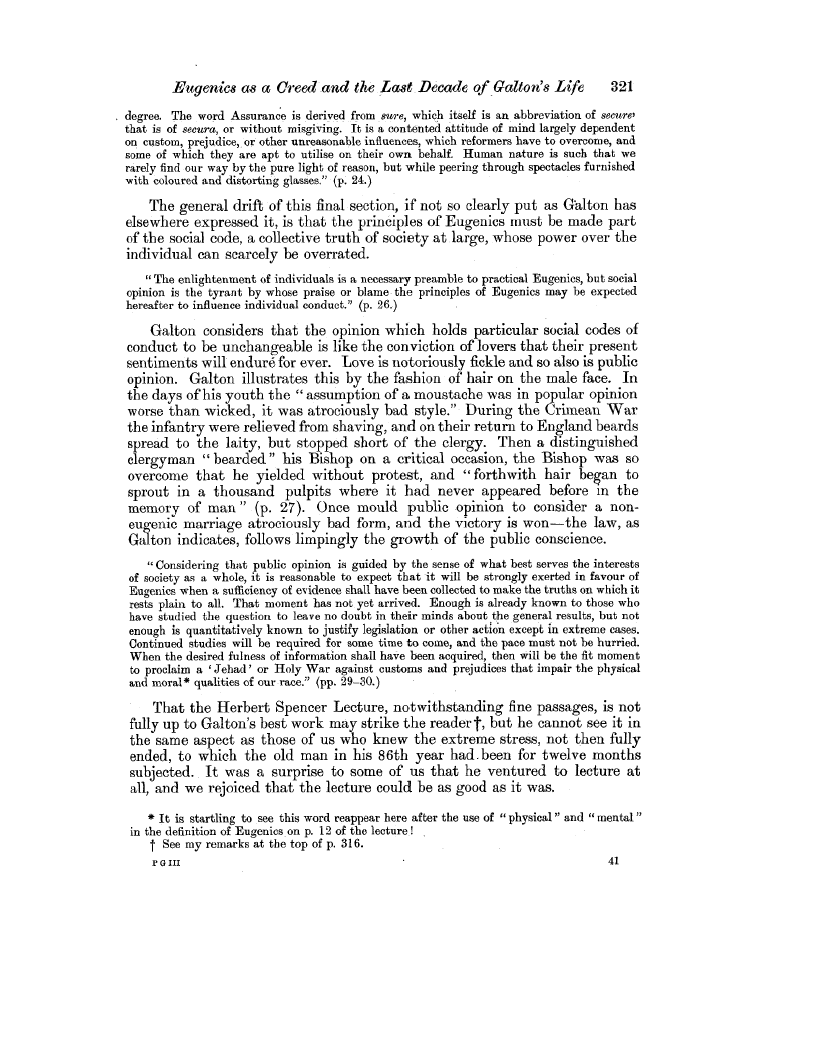| ||||||

OCR Rendition - approximate
Eugenics as a Creed .and the Last Decade of Galton's Life 321 degree. The word Assurance is derived from sure, which itself is an abbreviation of secure, that is of secura, or without misgiving. It is a contented attitude of mind largely dependent on custom, prejudice,_ or other unreasonable influences, which reformers have to overcome, and some of which they are apt to utilise on their own behalf. Human nature is such that we rarely find our way by the pure light of reason, but while peering through spectacles furnished with coloured and distorting glasses." (p. 24.) The general drift of this final section, if not so clearly put as Galton has elsewhere expressed it, is that the principles of Eugenics must be made part of the social code, a collective truth of society at large, whose power over the individual can scarcely be overrated. "The enlightenment of individuals is a necessary preamble to practical Eugenics, but social opinion is the tyrant by whose praise or blame the principles of Eugenics may be expected hereafter to influence individual conduct." (p. 26.) Galton considers that the opinion which holds particular social codes of conduct to be unchangeable is like the conviction of lovers that their present sentiments will endure for ever. Love is notoriously fickle and so also is public opinion. Galton illustrates this by the fashion of hair on the male face. In the days of his youth the " assumption of a moustache was in popular opinion worse than wicked, it was atrociously bad style." During the Crimean War the infantry were relieved from shaving, and on their return to England beards spread to the laity, but stopped short of the clergy. Then a distinguished clergyman "bearded" his Bishop on a critical occasion, the Bishop was so overcome that he yielded without protest, and " forthwith hair began to sprout in a thousand pulpits where it had never appeared before in the memory of man " (p. 27). Once mould public opinion to consider a noneugenic marriage atrociously bad form, and the victory is won-the law, as Galton indicates, follows limpingly the growth of the public conscience. "Considering that public opinion is guided by the sense of what best serves the interests of society as a whole, it is reasonable to expect that it will be strongly exerted in favour of Eugenics when a sufficiency of evidence shall have been collected to make the truths on which it rests plain to all. That moment has not yet arrived. Enough is already known to those who have studied the question to leave no doubt in their minds about the general results, but not enough is quantitatively known to justify legislation or other action except in extreme cases. Continued studies will be required for some time to come, and the pace must not be hurried. When the desired fulness of information shall have been acquired, then will be the fit moment to proclaim a `Jehad' or Holy War against customs and prejudices that impair the physical and moral* qualities of our race." (pp. 29-30.) That the Herbert Spencer Lecture, notwithstanding fine passages, is not fully up to Galton's best work may strike the reader t, but he cannot see it in the same aspect as those of us who knew the extreme stress, not then fully ended, to which the old man in his 86th year had -been for twelve months subjected. It was a surprise to some of us that he ventured to lecture at all, and we rejoiced that the lecture could be as good as it was. * It is startling to see this word reappear here after the use of " physical " and " mental " in the definition of Eugenics on p. 12 of the lecture! _ fi See my remarks at the top of p. 316. P G III 41
|